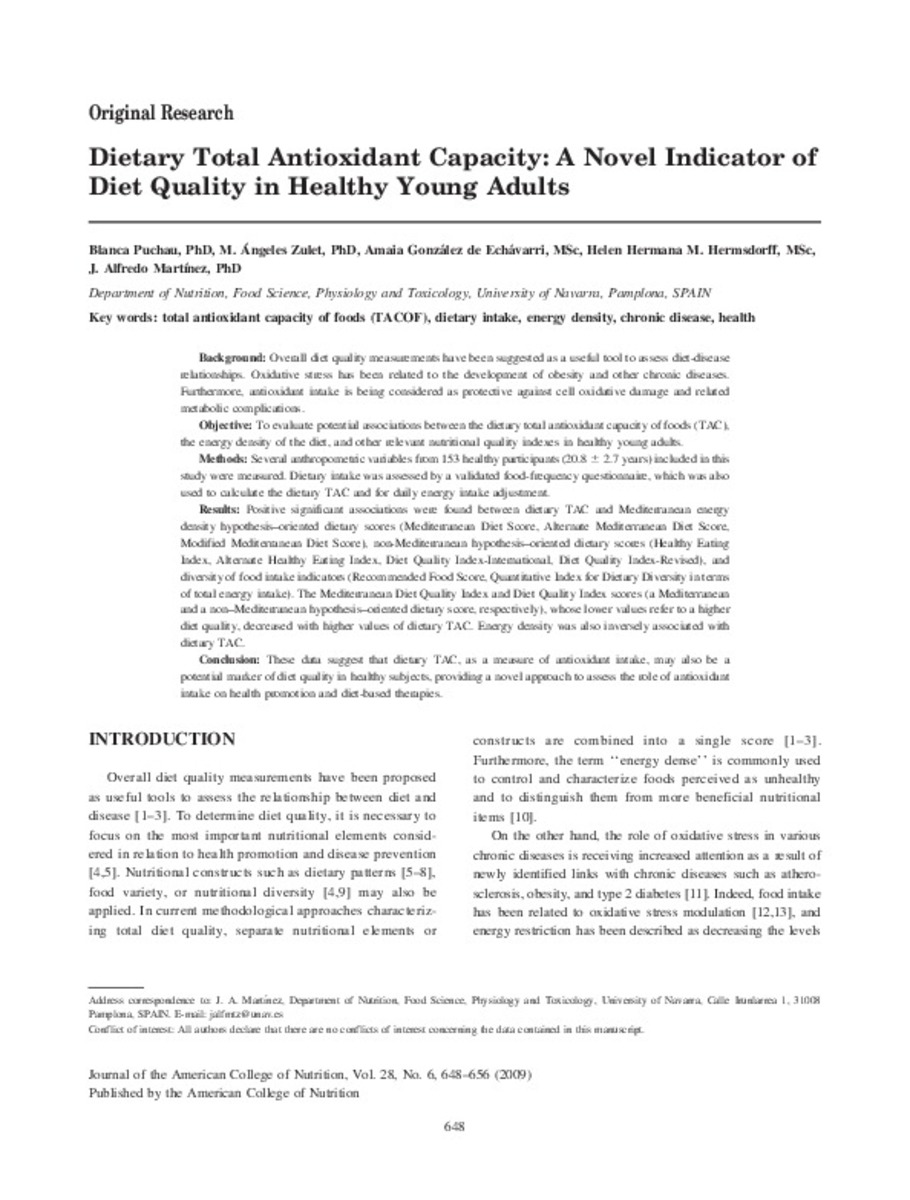Full metadata record
| DC Field | Value | Language |
|---|---|---|
| dc.creator | Puchau, B. (Blanca) | - |
| dc.creator | Zulet, M.A. (María Ángeles) | - |
| dc.creator | Gonzalez-de-Echavarri, A. (Amaia) | - |
| dc.creator | Hermsdorff, H.H. (H. H.) | - |
| dc.creator | Martinez, J.A. (José Alfredo) | - |
| dc.date.accessioned | 2013-05-06T10:10:36Z | - |
| dc.date.available | 2013-05-06T10:10:36Z | - |
| dc.date.issued | 2009 | - |
| dc.identifier.citation | Puchau B, Zulet A, Gonzalez de Echavarri A, Hermsdorff HHM, Alfredo Martinez J. Dietary Total Antioxidant Capacity: A Novel Indicator of Diet Quality in Healthy Young Adults. J Am Coll Nutr 2009 DEC;28(6):648-656 | es_ES |
| dc.identifier.issn | 0731-5724 | - |
| dc.identifier.uri | https://hdl.handle.net/10171/29158 | - |
| dc.description.abstract | Background: Overall diet quality measurements have been suggested as a useful tool to assess diet-disease relationships. Oxidative stress has been related to the development of obesity and other chronic diseases. Furthermore, antioxidant intake is being considered as protective against cell oxidative damage and related metabolic complications. Objective: To evaluate potential associations between the dietary total antioxidant capacity of foods (TAC), the energy density of the diet, and other relevant nutritional quality indexes in healthy young adults. Methods: Several anthropometric variables front 153 healthy participants (20.8 +/- 2.7 years) included in this study were measured. Dietary intake was assessed by a validated food-frequency questionnaire, which was also used to calculate the dietary TAG and for daily energy intake adjustment. Results: Positive significant associations were found between dietary TAG and Mediterranean energy density hypothesis oriented dietary scores (Mediterranean Diet Score, Alternate Mediterranean Diet Score, Modified Mediterranean Diet Score), non-Mediterranean hypothesis oriented dietary scores (Healthy Eating Index, Alternate Healthy Eating Index. Diet Quality Index-International, Diet Quality Index-Revised), and diversity of food intake indicators (Recommended Food Score, Quantitative Index for Dietary Diversity in terms of total energy intake). The Mediterranean Diet Quality Index and Diet Quality Index scores (a Mediterranean and a non Mediterranean hypothesis oriented dietary score, respectively), whose lower values refer to a higher diet quality, decreased with higher values of dietary TAG. Energy density was also inversely associated with dietary TAG. Conclusion: These data suggest that dietary TAG, as a measure of antioxidant intake, may also be a potential marker of diet quality in healthy subjects, providing a novel approach to assess the role of antioxidant intake on health promotion and diet-based therapies. | es_ES |
| dc.language.iso | eng | es_ES |
| dc.publisher | American College of Nutrition | es_ES |
| dc.rights | info:eu-repo/semantics/openAccess | es_ES |
| dc.subject | Total antioxidant capacity of foods (TACOF) | es_ES |
| dc.subject | Dietary intake | es_ES |
| dc.subject | Energy density | es_ES |
| dc.subject | Chronic disease | es_ES |
| dc.subject | Health | es_ES |
| dc.title | Dietary total antioxidant capacity: a novel indicator of diet quality in healthy young adults | es_ES |
| dc.type | info:eu-repo/semantics/article | es_ES |
| dc.relation.publisherversion | http://www.jacn.org/content/28/6/648.long | es_ES |
| dc.type.driver | info:eu-repo/semantics/article | es_ES |
Files in This Item:
Statistics and impact
Items in Dadun are protected by copyright, with all rights reserved, unless otherwise indicated.






